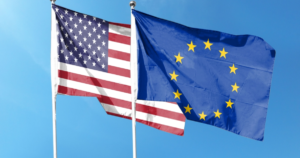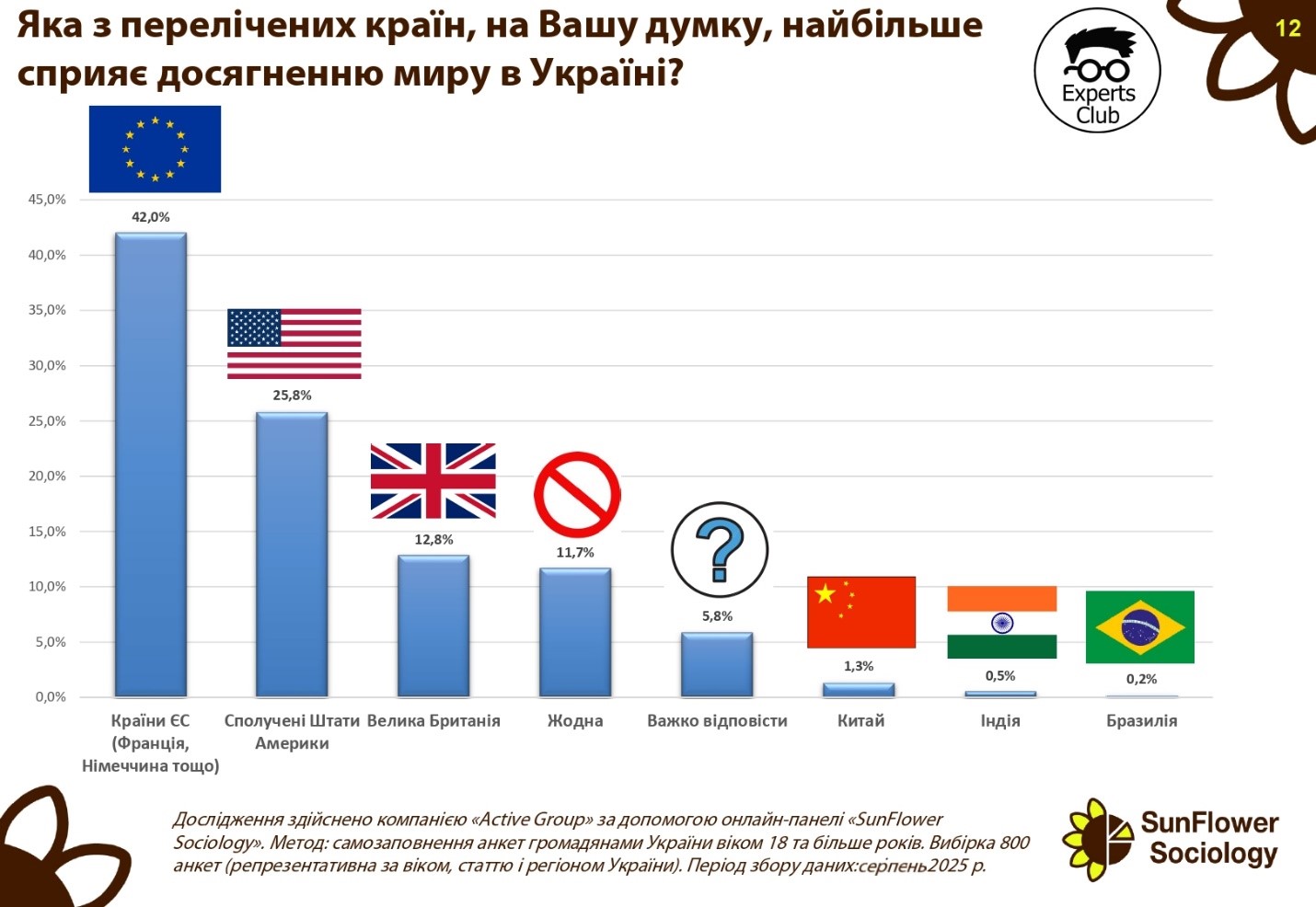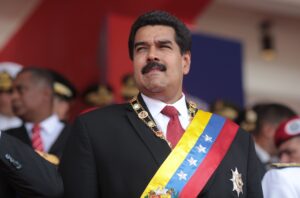
According to the results of a study conducted by Active Group and Experts Club in August 2025, Ukrainians rated the role of European Union countries in promoting peace in Ukraine the highest.
According to the survey, 42.0% of respondents believe that the EU (primarily France and Germany) is making the greatest contribution to the peace process. 25.8% of respondents noted the key role of the United States, and 12.8% noted the key role of the United Kingdom. At the same time, 11.7% of Ukrainians believe that no country is contributing to the establishment of peace, while 5.8% were unable to decide on an answer. Significantly fewer respondents noted other countries: China — 1.3%, India — 0.5%, Brazil — 0.2%.

“The results show that Ukrainians rate the diplomatic and political efforts of the EU and the US highest. Together with the UK, these countries form the main international triangle of trust for Ukrainian society,” said Active Group Director Oleksandr Pozniy.
Maksim Urakin, co-founder of Experts Club, emphasized the economic dimension of the partnership.
“For our country, it is important not only to have a political partnership with the EU, the US, and the UK, but also an economic one. China, on the other hand, despite its leadership in trade with Ukraine, remains on the periphery of the peace process,” he said.
The survey was part of a large-scale project by Active Group and Experts Club to study Ukraine’s international image and foreign policy orientations.
ACTIVE GROUP, CHINA, EU, EXPERTS CLUB, peace in Ukraine, Pozniy, SOCIOLOGY, UK, URAKIN, US

Venezuelan President Nicolás Maduro has announced the deployment (mobilization) of up to 4–4.5 million Bolivarian National Police officers in response to “threats from the US” and the build-up of American military presence in the Caribbean. This was reported by international media outlets, including El País, CBS News, and Al Jazeera.
According to the publications, Maduro’s statement came after the US decided to double the reward for information leading to his arrest and/or conviction to $50 million. The US State Department and the Associated Press/PBS agencies reported on the increase in the reward.
El País and other sources also note that Venezuela’s mobilization was a response to the deployment of US destroyers and other forces near the country’s coast, which has increased tensions in the region. Washington had previously accused Maduro of involvement in international drug trafficking and related crimes; the decision to increase the reward was announced this month.
American and international analytical publications note the growing military and political rhetoric on both sides and warn of the risks of further escalation. At the same time, there is no independent confirmation of the start of a “war” between the US and Venezuela; we are talking about mobilization steps and increased readiness against the backdrop of political confrontation.

The White House is looking for a venue for a possible meeting at the end of next week, where the US, Russia, and Ukraine could discuss resolving the conflict — with Ukraine actively demanding its participation in any negotiations.
CBS News representatives confirm that the US administration is looking for a venue for a meeting between Presidents Trump, Putin, and Zelensky, which could take place as early as next week.
The summit between Trump and Putin is scheduled for August 15 in Anchorage, Alaska, which the US administration is calling a fact-finding meeting, with no clear promises to end the conflict.

Ukrainian President Volodymyr Zelensky held talks with Turkish President Recep Tayyip Erdogan, during which the parties discussed the current diplomatic situation and the opportunities it opens up.
“President Erdogan confirmed his country’s readiness to organize a summit between the leaders of Ukraine, the US, Russia, and Turkey,” Zelensky wrote on Telegram on Tuesday.
According to him, Erdogan said that any negotiations without Ukraine would not bring stable peace.
“We all understand the risks and threats equally. A fake, rather than honest, peace will certainly not last long and will encourage Russia to seize even more territory. I noted that we are ready for any format of meeting in order to stop the killings and end the war,” the Ukrainian president added.
The parties also discussed high-level events that Ukraine is preparing during the UN General Assembly and Turkey’s participation in them.
According to the Turkish Presidency’s Twitter page, during the conversation, which took place at the request of the Ukrainian side, bilateral relations between Turkey and Ukraine, as well as regional and global issues, were discussed.
“Recognizing the valuable progress achieved in direct talks in Istanbul between Ukraine and Russia, President Erdogan expressed his hope that the next rounds of talks would yield meaningful results for a ceasefire on the path to lasting peace. Noting that Turkey is ready to host a summit at the leadership level, President Erdogan expressed his conviction that the establishment of working groups in the military, humanitarian, and political spheres will pave the way for the summit,” the statement said.
Erdogan also stressed that Turkey continues to support Ukraine’s sovereignty and territorial integrity.
As reported, last Friday, US President Donald Trump announced that his meeting with Vladimir Putin would take place on August 15 in Alaska.

The US White House’s Digital Assets Working Group has presented a strategic report with recommendations for forming a new regulatory framework for the crypto industry. This document is intended to lay the foundation for a “golden age of cryptocurrencies” in the United States, against the backdrop of tighter controls in the EU and China.
The group includes key figures:
• Secretary of the Treasury Scott S. Mnuchin;
• Secretary of Commerce Wilbur Ross;
• SEC Chairman (Securities and Exchange Commission) Paul Atkins.
Key provisions of the document
1. Division of powers between the SEC and CFTC. Cryptocurrencies will be classified according to a clear taxonomy:
Tokens with characteristics of securities (e.g., utility tokens or ICO projects) will remain under SEC control.
Commodity tokens, including Bitcoin and Ethereum, will fall under the CFTC’s jurisdiction, including spot markets.
Comment by Paul Atkins (SEC):
“A rational regulatory framework is the best way to protect investors, ensure transparency, and maintain U.S. leadership in global capital markets.”
2. Support for stablecoins as a geo-economic tool
The document emphasizes:
• the importance of dollar-pegged stablecoins for US global financial dominance;
• the need for legal control over their issuance;
• mandatory cooperation between issuers and law enforcement agencies, including the possibility of freezing or seizing digital assets.
3. Ban on the development of a digital dollar (CBDC)
The working group recommends officially abandoning the idea of a state digital currency, arguing that it poses a threat to privacy and expands the powers of the Federal Reserve. This is in line with Donald Trump’s position, who said that a digital dollar is “a path to totalitarian control.”
4. Tax reform
Proposals
• Create a separate tax regime for digital assets
• Recognize cryptocurrencies as a separate class of property
• Take into account the specific features of staking, DeFi, DAO, and other forms of digital income
5. Involvement of traditional banks
The White House proposes to allow US banks to legally provide cryptocurrency storage services, as well as related investment and settlement products. This is a way to increase competition with crypto exchanges and attract institutional capital.
The US is betting on crypto leadership, but in its own way.
• The new approach differs from the models of China and the EU. While Beijing is building total digital control through the yuan-CBDC, and Europe is strictly regulating DeFi and introducing wallet licensing, the US is choosing a liberal-institutional path without abandoning market initiative.
• Rejecting CBDC is a move that will delight privacy advocates but could weaken the US’s position in the international competition for digital currencies. However, there is also political pragmatism behind this decision: with the 2024 elections looming, this position is advantageous for Trump and his electorate.
• Recognition of the role of stablecoins suggests that the White House no longer sees them as a threat. On the contrary, they are becoming a tool for projecting US monetary policy on a global scale.
• In the future, a new tax jurisdiction could be implemented to encourage crypto startups to return from offshore locations and registrations in Singapore, Malta, and the UAE back to the US.
Comment from the Trump team
The report does not directly mention Bitcoin reserves, but Bo Hines, Trump’s cryptocurrency advisor, said:
“The infrastructure for Bitcoin reserves is already being developed. Details will follow.”
This confirms that crypto could become part of Trump’s economic platform in 2025.
The White House working group’s report marks a turning point — the US is not only not banning crypto, but is preparing to take control of the global crypto space. If the recommendations are implemented, this will increase the flow of capital into American projects and create standards that the whole world will follow.
Source: https://t.me/relocationrs/1247

The US has postponed sanctions against Serbian oil company NIS for the last time: a key company could be at risk
The United States has postponed for the fifth and final time the imposition of sanctions against Serbian oil company Naftna Industrija Srbije (NIS), which is controlled by Russia’s Gazprom. According to Reuters, the new exemption from the sanctions list has been extended until the end of August. No further extension is planned after that.
Serbian Energy Minister Dubravka Čedović Handanović said that Belgrade wants to keep oil supplies stable and called “the exclusion of NIS from OFAC sanctions a priority.” She said that dialogue between the US and Russia remains an important condition for this.
NIS is a strategically important company for the Serbian economy. It operates the country’s only oil refinery in Pančevo (near Belgrade), as well as the largest network of gas stations and logistics infrastructure in the fuel sector.
According to the ownership structure:
• 44.9% of NIS shares are owned by Gazprom Neft (Russia),
• 11.3% by Gazprom,
• 29.9% by the Serbian government,
• the rest by minority investors.
It was Russian control over the majority of shares that led to NIS being sanctioned by the US Treasury Department’s Office of Foreign Assets Control (OFAC). Initially, the company was to be completely blocked in January 2025, but since then it has received four temporary licenses to continue operations.
In July 2025, NIS applied for a temporary license for the fifth time and received it for one month, until the end of August. During this period, Gazprom Neft was again reminded of the requirement to withdraw from the Serbian company’s shareholders.
Analysts note that if the sanctions are imposed in full, this could destabilize the fuel market in Serbia, create logistical disruptions, and cause oil prices to rise.
An alternative could be a transfer of control from Russian shareholders to European or Middle Eastern investors, but negotiations on this issue have not yet been officially confirmed.
NIS is a leader in the Serbian petroleum products market and is actively developing its operations in Romania, Bulgaria, and Bosnia and Herzegovina.
The company is also involved in oil and gas exploration and production, lubricant manufacturing, and power generation.
Source: https://t.me/relocationrs/1228